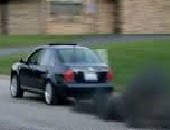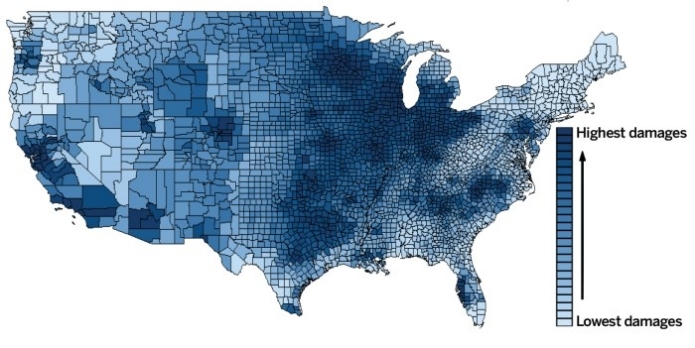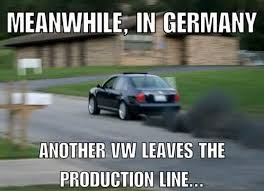Do you remember that cute VW video, “The Force”? The one where the little boy, dressed up as Darth Vader, can’t get a reaction from anyone or anything, even his dog, when he tries his super-powers on them? Then, Dad drives up in his VW Passat and the Vader-wannabe is, magically, able to get the lights to flash. The camera pans to parents looking out the window. Dad gives a conspiratorial grin as he clicks the remote control.
On September 18, 2015, world markets were rocked by news that Volkswagen had knowingly falsified its emissions of toxic nitrogen oxides. The news first came in the form of a citation from the US Environmental Protection Agency. For VW car models from 2009 to 2015, the makers admitted they had designed software that would activate emissions controls only during regulatory emissions testing, whereas in real life the diesel cars would regularly spew about 40 times the regulatory amount.
What is the cost of this lie?
“We estimate excess damages of $430 million and 46 excess expected deaths …due to excess emissions of toxic nitrogen oxides,” concluded a team led by Andrew Yates, professor at University of North Carolina at Chapel Hill, in the December 31, 2015, publication of a detailed investigation of the VW scandal in the journal Environmental Science and Technology.
“Our estimates incorporate significant local heterogeneity,” they wrote. The analysis is shown in a detailed map below.
Yates was joined by three co-authors from the National Bureau of Economic Research: Stephen Holland, Erin Mansur, and Nicholas Muller. “Accounting for uncertainty about emissions gives a range for damages from $350 million to $500 million, and a range for excess expected deaths from 40 to 52,” they wrote.
The team used data from a market research firm to ascertain the county-by-county locations of nearly 450,000 cheating cars registered in the US. They coupled this with data from the Federal Highway Administration to determine how far, on average, each affected model was driven.
The study listed sources of damage from the increased air pollution as: deaths, illnesses, reduced agricultural yield, degradation of buildings, reduced visibility, and reduced recreation.
The results are similar to an earlier estimate by Steven Barrett and co-workers at MIT, who wrote in Environmental Research Letters, “we estimate that the excess emissions will cause 59 early deaths in the US … [and] a social cost of ~$450m over the sales period.” Yates et al. explain how the two methodologies differ in their paper.
US regulators have now filed a lawsuit on behalf of American citizens affected by this violation of the Clean Air Act. As of January 2016, a Volkswagen official said the company is close to reaching an agreement with US regulators on the recall of affected vehicles. He said the company has reached an agreement with European regulators to update software on VW cars in 2016.
Besides damage to health, safety, and environment, consider the reputational damages: to those who owned stock in the company and will see the value decrease due to a drop in sales, and an increase in lawsuits; to those who purchased the cars, anticipating a certain resale value and now are stuck with “lemons”; and to those who intend to continue owning the VW car but must pay for costly upgrades to meet emissions tests.
The firm Brand Finance, which quantitatively estimates differences of brand value within sectors, issued a statement on its website: “At Brand Finance’s last calculation VW’s brand value stood at just over US$31 billion, making it the world’s 3rd most valuable auto brand. The developments of the last few days will undoubtedly send this trend into reverse, resulting in $10 billion in lost brand value.”
This case shows damage in three broad categories: physical risk (destruction of health and environment), operational risk (including legal, regulatory, and valuation sub-categories of risk), and reputational risk.
People are still shaking their heads over VW’s decision to gamble on harming people and the environment. VW’s cheating will continue to have repercussions on their business, and the automotive sector, for years. In its viral ad “The Force,” a sophisticated viewer may read more into the plot: a little child, is deceived by one who may, or may not, have his best interests at heart.ª



